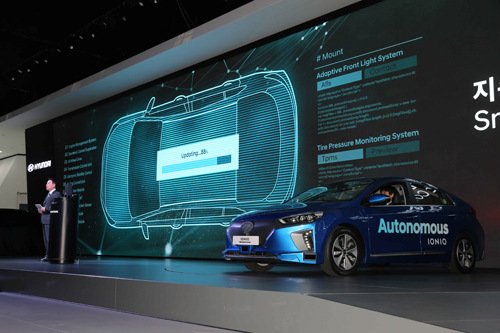‘Smart car ecosystem creation, omnidirectional support for initial commercialization of future car’
Park Byung Rib | riby@ | 2017-04-13 10:38:42

Self-driving car-Ioniq hybrid of Hyundai Motors in Seoul Motor Show 2017. Photo by Hyundai Motors
Market researcher IHS has predicted that the number of self-driving cars, which surpass 500,000 units by 2025, will reach 4.5 million units, nearly nine times 2030, five years later. The Korea Evaluation Institute of Industrial Technology estimates that the global smart car market will grow from USD 158.6 billion in 2010 to USD 301.1 billion in 2019 and the domestic smart car market will grow from USD 8.8 billion in 2010 to USD 13.8 billion in 2019.
It is clear that smart cars are a key area to lead the fourth industrial revolution. The Ministry of Commerce, Industry and Energy has selected electric, self-driving cars as one of the 12 new industries for the 4th Industrial Revolution and the ministry will create ecosystem for those industries. It is a strategy to lead the development of self-driving car industry ecosystem through supporting core technology development, testing bed, training manpower along with promoting convergence between automobile and other industries.
First of all, the ministry will invest KRW 110 billion in research and development (R & D) of key parts such as self-driving car sensors this year and develop core technologies by injecting more than KRW 500 billion by 2020. In particular, the ministry will spend KRW 145.5 billion by 2021 only on the development of nine core parts and systems for self-driving cars to recognize, judge, and control the car itself. The ministry also plans to acquire nine key technologies for self-driving car navigation such as radar, video, video module as well as V2X communication module, digital map along with compound positioning module, self-driving car driving recorder (ADR), driver car interface (HMI) module and integrated controller. We also build a common database (DB) necessary for development and performance evaluation of recognition algorithm (SW). The ministry plans to build a public standard DB to support the development of intelligent car recognition technology and to develop evaluation system to complete the development in 2020. The development of core technology such as safety system and driver convenience system to cope with international safety regulation R & D resources were increased by KRW 10 billion to KRW 37 billion.
The ministry will carry out expansion of test sites for evaluation of parts and system performance, and development of dedicated platforms along with actual road monitoring facilities to provide test beds. Advanced Driver Assistance Systems (ADAS) platform will be built under intelligent car driving test ground in Daegu from this year to 2020.
The ministry plans to train 480 professional manpower by 2021 by fostering future R & D manpower and doctor-level R & D manpower as one of the engineers of self-driving car development. The third self-driving car competition for universities and graduate students will be held in October, this year.
Industrial cooperation is important for self-driving cars as the industry converges various technologies such as electricity, electronics, communication, parts and materials. Therefore, the Ministry of Industry has formed a convergence alliance with more than 100 companies in the fields of cars, electricity, electronics, communications, parts and materials, and has gathered the wisdom of developing self-driving cars through communication and collaboration through development strategy forums and technical seminars.
International cooperation is also an area of concern. France, and KRW 1.5 billion invested in order to develop R & D international support system.
Especially, the Ministry of Industry launched the Car Industry Development Committee in February with the participation of private sector officials for the 4th industrial revolution. The top private experts in the field of cars participate in the project and act as joint policy coordinators. It is a strategy to develop the future car industry by selecting seven core policy agendas such as strengthening competitiveness of future cars, promoting innovation and convergence of auto parts industry ecosystem.
The Ministry of Industry is also working on expansion of electric cars and expansion of the infrastructure. The ministry plans to increase its subsidy for electric cars to 252,000 units in 2020 and to reduce electricity charges by 44%, and plans to increase the total number of electric car chargers to 2,500 units this year, including 2,500 electric chargers.
The minister of Ministry of Industry, Ju Hyung-hwan, said, ‘We will create an industrial ecosystem all over the country for the early commercialization of smart cars. We will boldly abolish regulations that hinder market launch and we will lay the legal and institutional basis necessary for a new paradigm in advance.’
By Park Byung Rib riby@
